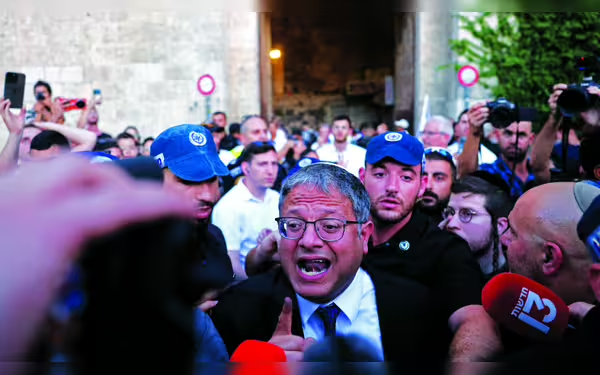Saturday, November 16, 2024 04:21 PM
Escalating Violations at Al-Aqsa Compound by Israeli Far-Right Groups
- Israeli settlers' entry into Al-Aqsa compound raises tensions.
- Human rights groups warn of record violations in 2024.
- Political climate fuels aggressive policies regarding sacred site.
 Image Credits: arabnewspk
Image Credits: arabnewspkIsraeli far-right violations at Al-Aqsa compound escalate, raising concerns among human rights groups and regional leaders.
The Al-Aqsa compound in East Jerusalem holds immense significance for both Muslims and Jews. For Muslims, it is the third-holiest site in Islam, while for Jews, it is known as the Temple Mount, believed to be the location of the ancient temples. This site has been a focal point of tension and conflict, particularly as Israeli far-right groups have increasingly violated the established norms governing access and worship there.
Recently, during the Jewish harvest festival of Sukkot, a significant number of Israeli settlers entered the Al-Aqsa compound, with reports indicating that over a thousand settlers occupied the site. This event occurred while the world was preoccupied with conflicts in Gaza and Lebanon, highlighting the ongoing tensions in the region. The Israeli police facilitated these entries, preventing Muslim worshippers from accessing the site, which has raised alarms among human rights organizations.
Ir Amim, an Israeli human rights group, has reported that 2024 is already a record year for violations of the status quo at the Al-Aqsa compound. They warn that these actions could lead to further violence, especially given the current political climate in Israel, where far-right figures like National Security Minister Itamar Ben Gvir are pushing for more aggressive policies regarding the site. Ben Gvir's controversial visits to the compound have been criticized for provoking tensions, and Hamas has linked these provocations to the recent escalation of violence.
The situation is further complicated by the broader geopolitical context. Arab and Muslim leaders recently convened in Riyadh, issuing a unified demand for Israel to withdraw from all occupied Palestinian territories. They reaffirmed East Jerusalem as the “eternal capital of Palestine” and condemned any Israeli actions aimed at altering its status. This reflects a deep-seated concern among Arab nations regarding the preservation of Islamic and Christian sites in the region.
For decades, a delicate balance has been maintained at the Al-Aqsa compound, allowing for Jewish visits while prohibiting prayer and religious displays. However, this balance is increasingly under threat. Israeli Prime Minister Benjamin Netanyahu had previously upheld this status quo, but recent actions suggest a shift towards allowing more Jewish religious expression at the site.
The United Nations Security Council has repeatedly criticized Israel for undermining the established norms at the Al-Aqsa compound. The Waqf, which manages the site, has expressed grave concerns over the increasing presence of settlers and the potential for violence. Historically, many Jewish visitors have been able to visit the site without incident, treated as guests rather than intruders. However, the current atmosphere is fraught with tension, and the potential for conflict looms large.
The situation at the Al-Aqsa compound is a microcosm of the larger Israeli-Palestinian conflict. As both sides navigate their historical claims and religious significance attached to the site, the risk of escalation remains high. It is crucial for all parties involved to engage in dialogue and seek peaceful resolutions to ensure that this sacred space can be respected by all, fostering coexistence rather than conflict.













